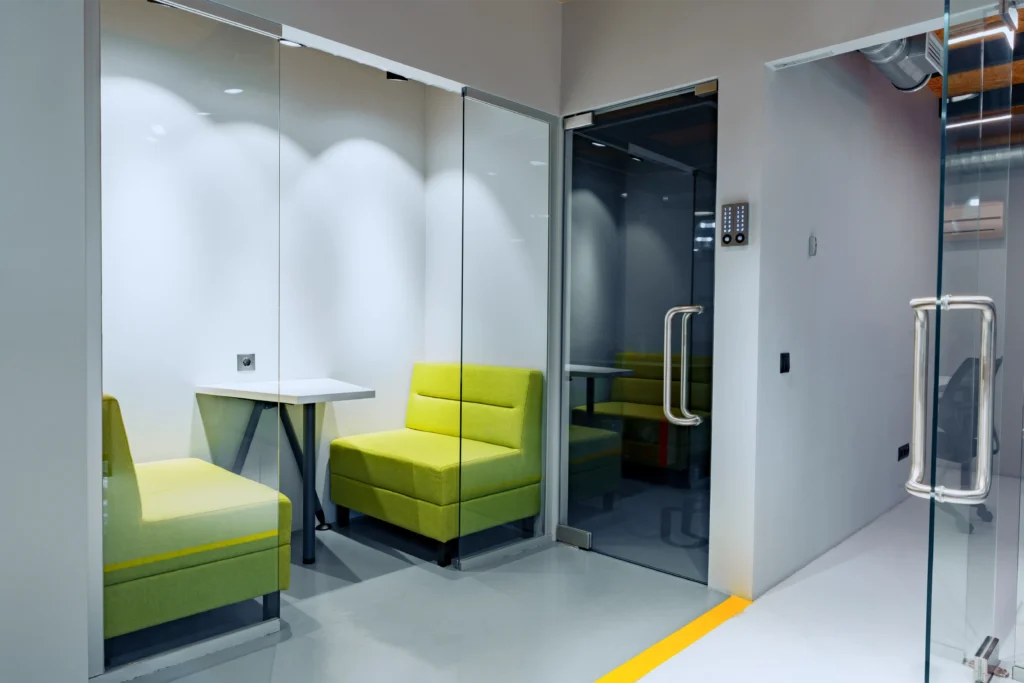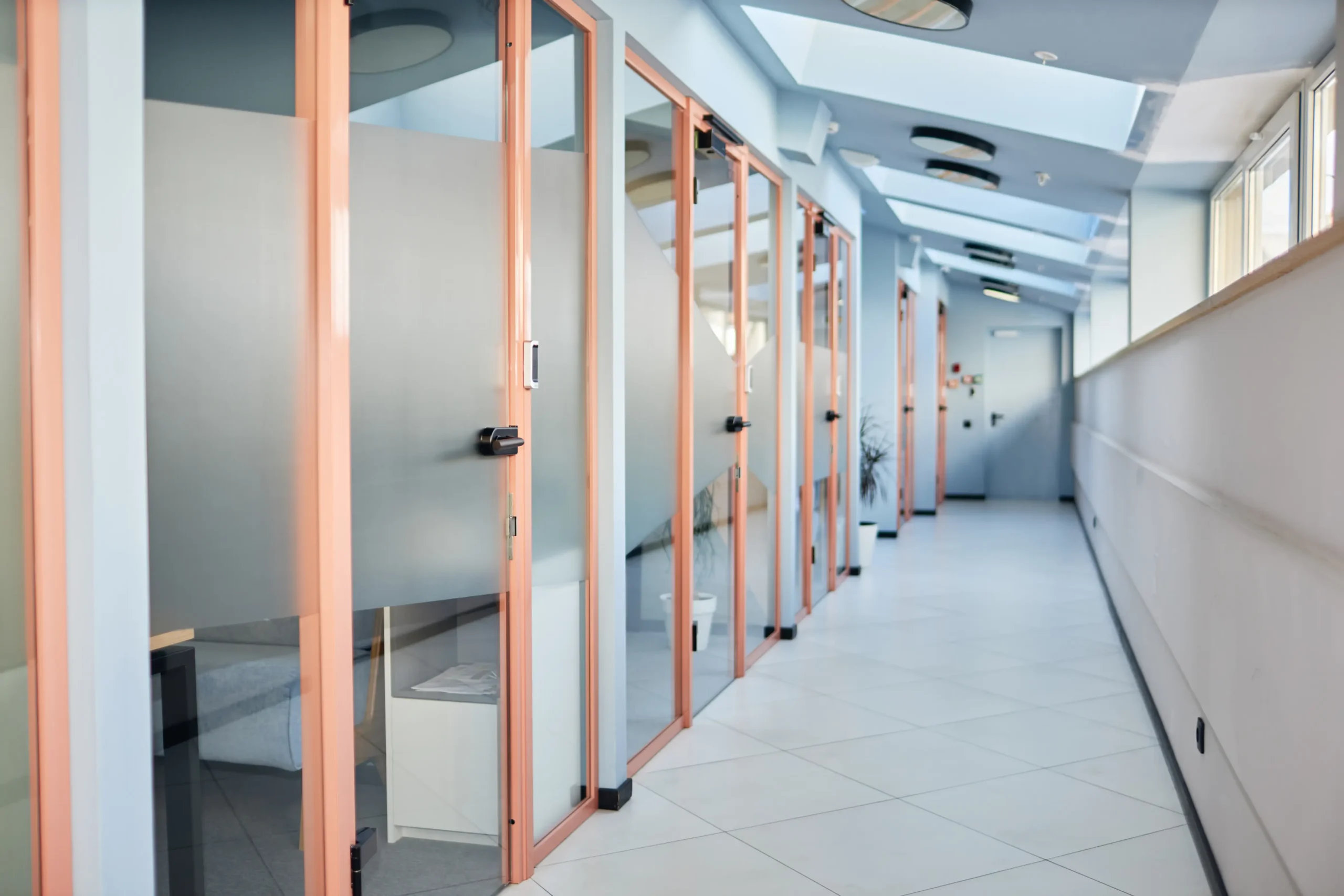Introduction
Soundproof Glass is transforming urban living by providing quiet, comfort, and style in even the busiest environments. For homeowners, office managers, and hospitality developers, controlling noise has become just as important as aesthetics and energy efficiency.
Whether your property is located near highways, airports, busy streets, or construction sites, soundproof glass offers a practical solution. It not only blocks unwanted noise but also allows natural light to penetrate, preserving the openness of your living or working space.
Modern soundproof glass combines laminated layers, acoustic interlayers, double or triple glazing, and advanced insulation. Together, these features can reduce noise by up to 90%, making it ideal for urban homes, commercial offices, hotels, and luxury apartments.
In this comprehensive guide, we’ll dive deep into how soundproof glass works, its applications, types, installation considerations, maintenance, and future innovations shaping modern architecture.
1. How Soundproof Glass Works
Soundproof Glass operates through a combination of physical layers and specialized acoustic technology. Here’s how it works:
a. Laminated Glass Layers
Laminated glass consists of two or more glass panels bonded with an acoustic interlayer, often polyvinyl butyral (PVB) or ionoplast. This layer absorbs vibrations from sound waves, reducing noise transmission.
b. Acoustic Interlayers
These specialized layers act as a buffer that dampens sound energy. Different thicknesses and densities can be used depending on the level of noise reduction needed.
c. Double & Triple Glazing
Using multiple panes of glass separated by air or gas-filled spaces enhances sound insulation. The gap acts as a sound barrier, and when combined with laminated layers, the result is near-total noise control.
d. Sealed Frames & Precision Installation
Even the best glass can fail if the frame is not airtight. Professional installation ensures there are no gaps where sound can leak, maximizing the acoustic efficiency of the system.
2. Benefits of Soundproof Glass
Investing in soundproof glass offers a wide range of benefits beyond noise reduction:
a. Noise Reduction
By significantly blocking external noise, soundproof glass creates a calm and peaceful environment. This is particularly valuable in cities, near airports, or for properties close to busy roads.
b. Privacy
Soundproof glass also minimizes internal sound transfer, offering privacy between rooms in offices, multi-family residences, or hotel suites.
c. Energy Efficiency
Many soundproof glass systems are double or triple-glazed, which also improves insulation. This reduces energy consumption for heating and cooling, lowering utility bills.
d. Modern Aesthetics
Unlike bulky soundproof walls, soundproof glass maintains sleek, contemporary designs. It lets in natural light while providing transparency, perfect for offices, high-rise apartments, and luxury homes.
e. Property Value
Homes and offices equipped with soundproof glass are highly desirable. Quiet, comfortable, and energy-efficient properties often command higher resale or rental values.
3. Applications of Soundproof Glass
Soundproof Glass can be used in multiple settings where controlling noise is a priority:
a. Residential Homes
Urban homes or those near busy roads benefit immensely from soundproof glass. It ensures that family members enjoy peaceful sleep, focused work-from-home environments, and outdoor areas free from intrusive noise.
b. Commercial Offices
Open-plan offices are notorious for distractions. Soundproof glass partitions or windows reduce ambient noise, enhancing productivity and focus. Private meeting rooms or executive offices benefit the most.
c. Hotels & Hospitality
Guest comfort is paramount. Soundproof glass allows hotels to offer quiet rooms even in bustling city centers or near airports. Balconies and windows maintain views while keeping interiors silent.
d. Luxury Apartments
High-end urban apartments rely on soundproof glass to provide exclusivity and privacy. Residents enjoy tranquility despite city noise, increasing property appeal and market value.
e. Restaurants & Cafes
Soundproof glass can separate indoor dining from street noise or busy kitchens, enhancing the customer experience.

4. Types of Glass Which Are Soundproof
There are several types of soundproof glass, each suited for specific noise challenges:
a. Double-Glazed Acoustic Glass
Two panes separated by an air or gas layer, ideal for moderate noise reduction like city streets or suburban homes.
b. Triple-Glazed Systems
Three glass layers with air or gas gaps for higher noise reduction, suitable for airports or industrial areas.
c. Laminated Acoustic Panels
Laminated panels with acoustic interlayers offer advanced sound-blocking and safety benefits, commonly used in luxury homes and hotels.
d. Hybrid Energy-Efficient Glass
Combines acoustic laminates with low-E coatings or solar control layers, providing both noise reduction and energy efficiency.
5. Design Considerations
Soundproof Glass can be customized to fit any architectural style:
- Transparency: Clear glass preserves views and natural light.
- Tinted or Frosted Panels: Offer privacy without sacrificing light.
- Frame Options: Aluminum, uPVC, or timber frames, designed to seal tightly and complement aesthetics.
- Shape & Size: From floor-to-ceiling windows to sliding doors, panels can be adapted to any space.
Designers often integrate soundproof glass with modern minimalistic aesthetics, ensuring that functionality does not compromise style.
6. Installation Considerations
Proper installation is crucial for achieving the full benefits of soundproof glass:
- Precise Measurements: Even slight gaps reduce acoustic performance.
- Airtight Seals: Prevent sound from leaking around frames.
- Structural Support: Ensure walls and frames can handle heavier acoustic glass.
- Professional Expertise: Certified installers guarantee compliance with building codes and optimal performance.
7. Maintenance Tips
Soundproof glass is low maintenance but requires routine care to maintain performance:
- Clean with mild, non-abrasive glass cleaners.
- Inspect seals and frames for wear or gaps over time.
- Avoid applying harsh chemicals or pressure that could damage laminated layers.
- Regularly check for scratches or cracks, especially in high-traffic areas.
8. Acoustic Performance Standards
Soundproof glass is rated using metrics such as STC (Sound Transmission Class) or Rw (Weighted Sound Reduction):
- STC 35–40: Suitable for suburban homes.
- STC 45–50: Urban residences near traffic or moderate industrial noise.
- STC 55+: Airports, busy highways, or commercial settings requiring maximum noise reduction.
Choosing the right rating ensures optimal performance for your specific environment.
9. Real-World Case Studies
a. Urban High-Rise Apartments
Installing triple-glazed soundproof windows in apartments near city centers reduced external noise by over 70%, improving tenant satisfaction and property value.
b. Hotels in City Centers
Hotels using laminated acoustic glass achieved a quieter guest experience without compromising natural light or city views.
c. Luxury Homes Near Airports
Strategically installed soundproofed glass reduced aircraft noise, enabling comfortable living and maintaining architectural aesthetics.
10. Cost Considerations
Factors affecting soundproof glass costs include:
- Number of glass layers (double vs triple glazing).
- Acoustic interlayer thickness and type.
- Size of panels and frames.
- Integration with energy-efficient or smart glass features.
While initial investment is higher than standard glass, the benefits of tranquility, energy savings, and increased property value make it a long-term investment.
11. Future of Soundproofs
The next decade will bring innovations such as:
- Nanotechnology coatings for thinner, stronger acoustic panels.
- Smart glass integration controlling transparency and light along with soundproofing.
- Eco-friendly acoustic materials, combining sustainability with high performance.
- Customizable acoustic laminates for personalized noise reduction levels.
These advancements promise quieter, more energy-efficient, and aesthetically versatile solutions for modern living.
Conclusion
Soundproof Glass is the ultimate solution for creating peaceful, stylish, and efficient environments in homes, offices, and hospitality spaces. By combining advanced acoustic layers, high-quality frames, and modern design, soundproof glass reduces noise while maintaining openness and light.
From city apartments and urban offices to luxury hotels and residential retreats, investing in soundproof glass provides comfort, privacy, energy efficiency, and long-term property value. It is no longer just a practical choice — it’s an essential feature for modern architecture and a hallmark of sophisticated, contemporary living.



